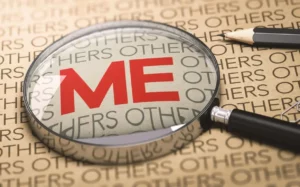What Is Narcissistic Personality Disorder?
Narcissistic personality disorder (NPD) is a psychological condition that affects how people think, feel, and behave in their everyday lives. People who suffer from NPD experience an excessive sense of grandiosity or importance. Moreover, they end up demanding admiration, special treatment, and attention from others without reciprocating any interest or care for them.
As such, it is important to learn more about this mental health disorder, including what it is, its symptoms, and its effects. The word gets misused often to describe a difficult or triggering person, however, narcissists are only 1 to 2% of the population.

Defining Narcissistic personality disorder (NPD)
Narcissistic personality disorder (NPD) is a mental health condition that affects an individual’s perceptions and behaviors. People with NPD have an inflated sense of self-importance combined with a need for admiration from others, often without any regard for the feelings or needs of other people. They may also display grandiosity, arrogance, and entitlement in their behavior toward others. Other symptoms of NPD may include difficulty forming meaningful relationships and feelings of low self-esteem and insecurity.
How Is the Term Often Misused?
The term “NPD” is misused as a catch-all phrase for anyone who may have some narcissistic traits. However, it’s important to note that having certain narcissistic traits does not necessarily mean someone has NPD and should not be used in a derogatory manner. For an individual to receive an official diagnosis of narcissistic personality disorder, they must meet criteria set forth by the Diagnostic and Statistical Manual of Mental Disorders (DSM-5) and be diagnosed by a professional.
What Is The Criteria?
The criteria for Narcissistic personality disorder include having an exaggerated sense of self-importance, a need to be admired and respected by others, and difficulty forming meaningful relationships with others. Narcissists also have an inability to empathize with the feelings or needs of other people. Additionally, those suffering from NPD may display grandiosity in their behavior or attitude toward others. All in all, suspected narcissists must be properly diagnosed by a professional to know their diagnosis.
How Many People Have NPD?
It is estimated that around 0.5 to 5% of the U.S. population has Narcissistic Personality Disorder, with more men than women affected by the condition. NPD can occur at any age but typically first develops during adolescence and continues into adulthood if left untreated.
Studies suggest that around 7.7% of men in the US have Narcissistic Personality Disorder, compared to 4.8% of women affected by the condition. It is believed that NPD may be more common among men due to gender differences in socialization and perceptions of self-worth.
The Effects of NPD
The effects of NPD can be far-reaching and may significantly impact both the sufferer and those around them. Those with NPD may experience difficulties in their relationships and feelings of low self-esteem, insecurity, and depression among others. Additionally, people with this disorder may become aggressive or hostile if they feel like their grandiosity is not being respected or admired by others. They also struggle to display empathy toward others and are more concerned with their needs and selfishness.
Effects of NPD on Loved Ones and Their Mental Health
The effects of narcissistic personality disorder can be far-reaching, not just for the sufferer. Those close to a person with NPD may find their behavior draining and exhausting and alienating them from friends or family members. Additionally, people in relationships with someone suffering from NPD may experience feelings of low self-esteem and insecurity due to their partner’s demands for admiration and attention.
Signs and Symptoms of NPD
The signs and symptoms of narcissistic personality disorder can vary from person to person but typically include:
- An exaggerated sense of self-importance
- A need for admiration and respect from others
- Grandiosity in behavior or attitude toward others
- Difficulty forming meaningful relationships with other people
- Inability to empathize with the feelings or needs of other people
- Feeling entitled to special treatment by others
- Becoming aggressive or hostile (in relation to the other signs)

NPD and Empaths-Toxic Relationship Dynamic
For those highly sensitive to the emotions and needs of other people, being in a relationship with someone suffering from NPD can be especially difficult. Empaths may find themselves constantly giving more than they receive, sacrificing their emotional needs to make their partner happy. This dynamic can be emotionally exhausting, leading empaths to feel taken advantage of or ignored by their partner.
What To Do When in This Type of Relationship?
If someone is in a relationship with someone suffering from NPD, taking steps to protect their mental health and well-being can be helpful. It is essential to recognize the behaviors of someone with NPD are not their fault. Nor do not reflect who they are. Additionally, resources are available for those who need additional support or guidance when dealing with this type of relationship dynamic, such as seeking professional help and therapy.
How to Get Someone with NPD to Seek Help
Getting someone with Narcissistic personality disorder to seek help can be challenging. They may not recognize the need or believe they have a problem. Therefore, it is crucial to approach the situation in a sensitive and non-judgmental manner. This looks like someone expressing concern for their well-being without attempting to diagnose them. Additionally, it can be helpful to provide resources such as books or articles on NPD. These can help them gain more insight into the condition and its effects on those around them.
NPD Support and Therapy in Dunwoody, GA
Living with NPD can be challenging for the sufferer and those close to them. If you are struggling with NPD or in a relationship with someone who has it, help is available. We at Southern Live Oak Wellness in Dunwoody, Georgia can help. We offer customizable support and therapy treatment programs to help you and your loved one.
Contact us today to schedule an initial consultation.
Ready To Get Started
Take the first step towards the future you deserve.
What Our Clients Say
-
I have so much to say about this wonderful place, but I’m sure my words will never do my experience justice. Southern Live Oak Wellness and it’s people not only helped me find myself again, but they saved my life.
Alex M.
Johns Creek, GA -
Southern Live Oak Wellness saved my life. The therapists genuinely care about the clients and helping them get better. Working on yourself is not easy, but the therapists help guide you and make you be able to work through whatever may be going on.
Rachel S.
Lawrenceville, GA -
I can easily say that Southern Live Oak wellness saved my life. I had hit rock bottom when I first got admitted and they helped me build myself up from nothing. I have learned how to cope with things I never thought I would be able to handle.
Taylor R.
Dallas, GA
-
Going to SLOW has impacted my life in ways I never thought possible. I came for help with my mental state and came out with so much more; life skills, medical advice, mental health counseling and addiction treatment. SLOW is a whole life transformation program and I highly recommend it to anyone I know!
Kaylan F.
Kennesaw, GA -
When I was a part of this program, I had the most personal growth I’ve had in my entire life. All of the tech staff were willing to talk to me whenever I felt like I needed someone to talk to and the group sessions gave me multiple perspectives I never would’ve thought of from people in similar situations to me.
Dylan C.
Belleville, IL -
This place has changed my life. For the first time in my life I felt heard and cared about. The clinical staff is amazing. The groups are well structured. You learn a lot of different skills to help you in life this is the best mental health facility to come to.
Ashley H.
Brunswick, GA
